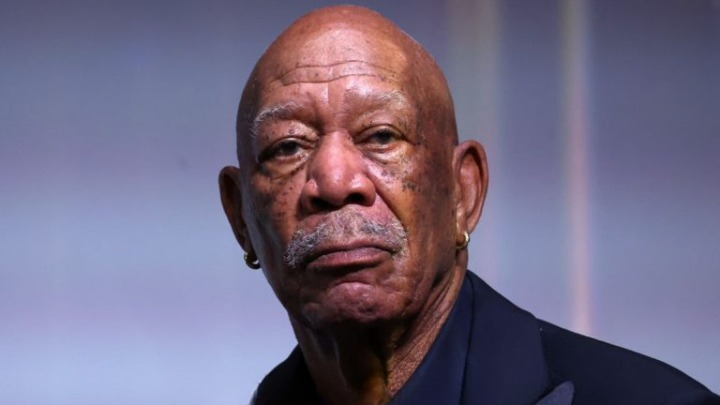Charleston, Mississippi — The peaceful rural roads of Charleston were shattered late Sunday night when Academy Award-winning actor Morgan Freeman, one of Hollywood’s most respected figures, was involved in a serious car accident near his Mississippi home. The beloved actor, then 71 years old, was driving his 1997 Nissan Maxima when the vehicle suddenly veered off the highway, flipped multiple times, and came to a violent stop in a roadside ditch.

Emergency crews rushed to the scene around 11:30 p.m., following frantic calls from passing motorists. Freeman’s accident shocked fans across the world, instantly dominating headlines. Known for his deep voice, calm authority, and legendary roles in The Shawshank Redemption, Million Dollar Baby, and The Dark Knight, Freeman was now the center of a real-life drama that tested his endurance and strength.
A Harrowing Late-Night Rescue
Authorities quickly confirmed that Morgan Freeman and his passenger, Demaris Meyer, a woman from Memphis, Tennessee, were both trapped inside the mangled vehicle. They had been wearing seatbelts, a factor that likely saved their lives.
Rescue workers labored for nearly an hour, using hydraulic cutting equipment — known as the “jaws of life” — to pry open the twisted metal and free the two occupants. Both were conscious but in pain. Witnesses described the scene as chaotic but hopeful, with emergency lights illuminating the quiet country road.
Once freed, Freeman and Meyer were immediately airlifted to the Regional Medical Center in Memphis, roughly 90 miles from the accident site. Hospital spokeswoman Kathy Stringer later confirmed that Freeman was in serious condition but had remained alert and communicative throughout the ordeal. “He was talking and responsive when he arrived,” she reported, reassuring fans that the actor’s remarkable composure had not wavered even in crisis.
“He Was Cracking Jokes”: Freeman’s Spirit Shines Through
Clay McFerrin, a local journalist and editor of the Charleston Sun Sentinel, arrived at the crash site soon after the accident and was one of the first to speak publicly about the event. His account painted a powerful picture of the actor’s trademark calm. “They had to use the jaws of life to extract him from the vehicle,” McFerrin recalled. “Despite his injuries, he was lucid and even joking with some of the rescue workers. That’s just who Morgan Freeman is — composed, good-natured, and resilient.”
The Mississippi Highway Patrol later confirmed that no drugs or alcohol were involved in the crash. Sergeant Ben Williams stated that the vehicle appeared to have left the roadway “for reasons still under investigation,” adding that Freeman may have overcorrected after drifting off the pavement, causing the car to overturn several times.
A Close Call That Shook Hollywood
News of Freeman’s accident spread rapidly across social media, prompting an immediate outpouring of support from colleagues, fans, and public figures. Bill Luckett, Freeman’s longtime friend and co-owner of his restaurant Madidi in Clarksdale, offered an encouraging update. “Morgan is sitting up and talking,” Luckett told reporters. “He’s in good spirits and getting the best medical care available.”
Hollywood quickly rallied around him. Directors, co-stars, and admirers from around the globe expressed relief that the accident wasn’t fatal and praised Freeman’s strength. Messages of love and support flooded social media platforms, transforming concern into a wave of optimism.
Freeman’s representatives released a brief but heartfelt statement thanking the public for their compassion. “Morgan Freeman is receiving treatment and is expected to recover,” it read. “He appreciates everyone’s prayers and kind words during this time.”
A Titan of Cinema: Freeman’s Enduring Legacy
Few actors have achieved the legendary status that Morgan Freeman holds in Hollywood. Over a career spanning more than five decades, he has delivered some of cinema’s most unforgettable performances, captivating audiences with his distinctive voice, measured poise, and unshakable moral depth.
Freeman rose to prominence with Driving Miss Daisy (1989), earning a Golden Globe Award and an Oscar nomination for his portrayal of chauffeur Hoke Colburn. He later starred in The Shawshank Redemption (1994), widely regarded as one of the greatest films ever made, and took home the Academy Award for Best Supporting Actor in 2005 for his role in Million Dollar Baby.
At the time of his accident, Freeman was in pre-production for “The Human Factor”, a Clint Eastwood-directed film in which he was set to portray Nelson Mandela. The movie would later be released as Invictus (2009), earning widespread critical acclaim. Freeman’s nuanced portrayal of Mandela would once again remind audiences of his rare ability to channel dignity, wisdom, and quiet strength through every role he plays.
He had also recently appeared in Christopher Nolan’s The Dark Knight, reprising his role as Lucius Fox, the brilliant CEO of Wayne Enterprises. The blockbuster’s success had solidified Freeman’s reputation not only as a cinematic icon but also as a voice of reason and wisdom in an industry often defined by chaos.
A Difficult Year for Hollywood’s Finest
Freeman’s crash came at a time when tragedy already loomed over The Dark Knight’s production. Earlier that same year, co-star Heath Ledger had died unexpectedly, sending shockwaves through the entertainment world. Soon after, Christian Bale faced public scrutiny following legal allegations in London, which were eventually dropped.
For fans, Freeman’s accident felt like yet another blow to the cast of one of the decade’s most successful and influential films. Yet through it all, his resilience remained a source of inspiration. Many who knew him personally were confident that if anyone could endure such a frightening ordeal with grace, it was Morgan Freeman.
The Man Behind the Voice: Wisdom and Calm Amid Adversity
Off-screen, Morgan Freeman has always been as remarkable as the characters he portrays. Friends often describe him as thoughtful, kind, and remarkably composed — a man who rarely loses his sense of humor or humility.
In interviews over the years, Freeman has spoken candidly about perseverance, often attributing his success to patience and an unshakable belief in purpose. These very qualities seemed to define his response to the crash. Despite serious injuries, he remained calm, communicative, and even lighthearted with first responders.
As news of his condition spread, fans shared videos of his film speeches online — moments of profound wisdom that now seemed prophetic. Lines from The Shawshank Redemption, where he played the wise inmate Red, took on new meaning: “Hope is a good thing, maybe the best of things, and no good thing ever dies.”
A Life of Philanthropy and Purpose
Beyond his cinematic achievements, Freeman has long dedicated himself to humanitarian efforts. He co-founded the Grenada Relief Fund, later renamed PLANIT NOW, to aid hurricane victims in the Caribbean. He has also supported education initiatives, environmental programs, and arts development projects in Mississippi — his lifelong home.
Freeman’s commitment to giving back reflects his belief that success is measured not by fame, but by impact. “If you’re in a position to help others,” he once said, “you’re obligated to do so. That’s the real reward of living.”
The Investigation and Road to Recovery
Authorities continued to examine the crash site for days after the accident. Early findings suggested that Freeman’s vehicle drifted off the road and that an overcorrection caused it to flip. The stretch of highway — known for its sharp curves and limited visibility — was later reopened after debris removal.
Medical teams reported that Freeman suffered multiple fractures and injuries but remained in stable condition. Demaris Meyer, his passenger, also received treatment and was expected to recover fully.
Those closest to Freeman expressed confidence in his recovery, citing his strong will and determination. “Morgan is one of the toughest people I know,” said a family acquaintance. “He’s resilient — both in body and in spirit.”
A Symbol of Strength and Hope
In the months following the crash, fans continued to send letters and gifts to the hospital, while communities in Mississippi held vigils praying for his recovery. Across Hollywood, colleagues referred to him as a “symbol of strength,” a man whose real-life resilience mirrored the characters he brought to life on screen.
As his condition improved, Freeman began to receive visitors and was eventually discharged to continue his recovery at home. The actor later expressed gratitude to the emergency responders who saved his life, saying, “I’m thankful for every hand that helped me through that night.”
Returning to the Spotlight
True to form, Morgan Freeman made a steady comeback. Within a year, he returned to work, continuing to captivate audiences with performances that carried even deeper emotional weight. His experience had changed him, but it had not slowed him down.
When asked about the crash in later interviews, Freeman reflected with humility: “I’ve always believed in grace — both the kind we receive and the kind we show others. That night reminded me how fragile life is and how precious each day can be.”
The Power of Resilience
Today, Morgan Freeman’s story stands not only as a tale of survival but also as a testament to human resilience. His ordeal on that Mississippi road became another chapter in a life defined by endurance, wisdom, and strength.
Fans continue to celebrate his contributions to film and humanity, seeing in him not just an actor, but a symbol of courage and perseverance. Whether delivering a line that stirs the soul or overcoming adversity in his own life, Freeman embodies the quiet heroism that inspires millions.
Conclusion: The Man Who Keeps Moving Forward
The night of Morgan Freeman’s car accident could have ended very differently. But through a combination of luck, quick emergency response, and Freeman’s own strength, tragedy was averted. His recovery served as a reminder of his inner resilience — a trait that has guided him throughout a lifetime of challenges and triumphs.
From Driving Miss Daisy to The Shawshank Redemption and Invictus, Freeman has taught audiences about hope, endurance, and redemption. And off-screen, his real-life story mirrors those same lessons.
As fans continue to celebrate his work and wish him continued health, one thing remains clear: Morgan Freeman’s voice — both literal and symbolic — will never fade. His journey from that overturned car on a Mississippi highway to recovery and renewed purpose stands as a powerful reminder that even in our darkest moments, grace and strength can carry us forward.





